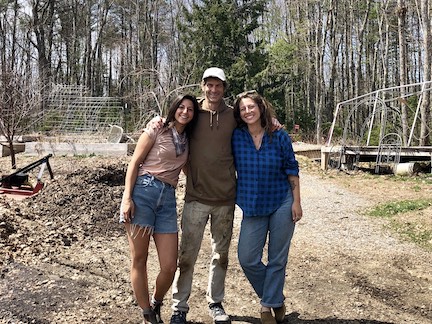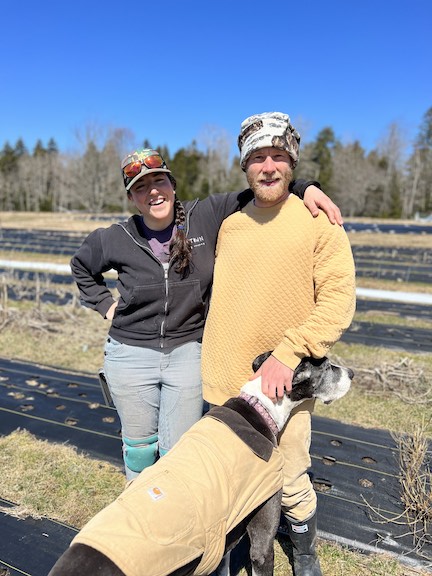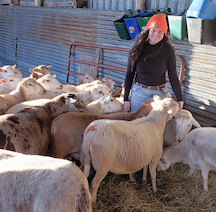By Sam Schipani
Zoe Shwidock and Nicole Heker had been working and apprenticing on farms for years when they decided they wanted to strike out on their own. They had a vision of growing local herbs for teas, medicine, and more to fill a niche for their community in Arundel.
They had a problem though. They needed land, and they couldn’t afford it.
Land access is a barrier for many new and prospective farmers in Maine — a barrier that has only intensified with development pressures and increased market prices during COVID-19. According to a 2022 report from the U.S. Department of Agriculture, Maine farmland prices increased 10% in the last five years, from $2,370 per acre in 2018 to $2,860 per acre in 2022.
Luckily, Maine’s farmers are creative, innovative and community-minded. Over the past few years, MOFGA has seen an increase in beginning farmers accessing land and incubating their businesses through leases with established farms. The new farmers are given access to land, and the established farms can transform otherwise underutilized pieces of their property into productive land while earning an additional source of income — a win-win for both parties.
Shwidock and Heker approached Noah Wentworth, co-owner of Frinklepod Farm, who they had met through an apprentice working on his farm. “The apprentice community in our area is really thick,” says Heker. Wentworth, who has owned his farm for 11 years and grew up farming in Maine, was leasing an underutilized parcel of land half a mile from his property. The landowner was a community member who wanted to keep the parcel in agricultural use.

“I started adding compost and amendments to it with the intention of making it available to Frinklepod to have more cropland to utilize, but once I turned the land and prepped it, it seemed to make sense to have somebody else utilizing it,” says Wentworth. “When Nicole and Zoe came along it seemed like a good fit. If you have extra land, it seems like a good way to keep your land in active agriculture and improve it.”
With the landowner’s permission, Wentworth leased half an acre to Shwidock and Heker to start their herb growing venture, Wild Few Herb Farm.
“It’s convenient for us because we can just pop over and ask questions,” Heker says. “It’s been so helpful. Land access is increasingly becoming harder and harder for young farmers like us. That support system of more experienced farmers helping younger farmers, there’s so much benefit to that.”
The three attended MOFGA’s Farmer to Farmer Conference and worked together for a growing season before deciding to enter a lease agreement in 2022.
Shwidock and Heker developed their friendship with Wentworth through their leasing relationship, and also by having him act as a mentor, but land-sharing arrangements can grow out of existing connections, too. Molly Friedland, owner of Little Red Flower Truck, and Clark Fountain, owner and operator of Fountain Farm, had already been friends for about a decade when Friedland decided to lease a half-acre of land from Fountain. Friedland has been developing no-till raised beds for cut flowers at her home in Ellsworth but realized it wasn’t enough space to achieve her vision for her business.

Molly Friedland, Clark Fountain and Pippa the dog. Friedland leases half an acre of land from Fountain Farm. Photo courtesy of Friedland
“Our business would not be where it is today without the land lease agreement we share with Fountain Farm,” Friedland says. “With the current state of the real estate market and no family farmland or inheritance to lean on, it is difficult to access prime farmland as a beginning farm/business. Being able to lease land is a really valuable tool, a way to learn how you actually want to build your farm and business before you land on your permanent spot. I think it’s really awesome that we had a foundation as friends, and I think this land lease has built on that and added to it.”
Fountain, who has owned 20 acres of land in Hancock since around 2019 and has roughly 5 acres in cultivation, saw the benefit of having Friedland, with her years of farming expertise, tending to the land.
“Especially in the initial stages that’s an important part to know if you’re just starting out you’re probably not going to use your footprint immediately so there’s room for that incubation stage,” Fountain says. “That person that’s leasing the land or sharing the land with you is only going to help improve the soil structure. It’s going to be something that’s beneficial to everybody.”
Land leasing can be a functional arrangement for livestock farmers, too. Andy Smith, co-owner of The Milkhouse, an organic cow dairy farm and creamery in Monmouth, established a leasing agreement with Heidi Duncombe for her business, Verdure Farm. Duncombe was working at The Milkhouse (a business she had fallen in love with years earlier through a summer farm tour series organized by MOFGA) in 2020 when Smith asked her if she had any interest in raising sheep. He had the opportunity to purchase a flock and was on the fence about it. Duncombe jumped at the chance and has been raising sheep ever since.

Heidi Duncombe operates Verdure Farm on land owned by The Milkhouse. Photo courtesy of Duncombe
“I am a first generation farmer, so capital and finances were a barrier for me,” Duncombe says. “Having this situation really makes that possible because I’m able to acquire the capital, the infrastructure and the equipment I need much slower than I would if I had to just start out on my own.”
Duncombe remains an employee of The Milkhouse, an arrangement that Smith and Duncombe agree has provided a sense of security for both of them.
“As a farm we can’t offer too many perks, but we’re fortunate enough to have extra pasture and hay land,” says Smith. “We’re helping her start her business and she’s helping us run our business, which helps us out a lot to be able to travel and do other things to know we have a long-term employee who’s invested in the place.”
Smith not only appreciates Duncombe’s work ethic as an employee and her excitement about the flock, but he notes that incubation was an important part of his farming journey — he and his wife, Caitlin, incubated their business at Two Loons Farm in South China in the early 2010s and saw this as an opportunity to pay it forward while shoring up the next generation of Maine farmers.
“If it weren’t for that, we wouldn’t have been able to go on to get a loan to buy a farm,” Smith says. “It’s so capital intensive to get started and it feels so risky.” He explains that they needed management experience to get a Farm Service Agency (FSA) loan, or to work with Farm Credit or CEI. “Otherwise, we just would have been a couple kids going to a lender and saying, ‘Hey, give us money for our fantasy business.’”
It was especially fortuitous because after a few years, Smith realized he didn’t really like sheep very much — he finds them “annoying” and “doesn’t love lamb enough to move Flexinet fencing” — but Duncombe loves her flock.
“I really like that they’re smaller than cows and a lot easier for me to handle by myself. I really enjoy that you can have more sheep on smaller pastures,” Duncombe says. “And calves are cute, but I think lambs are cuter.”
No matter what the land is supporting, though, there are best practices to forming this kind of relationship. Communication is the most important, so that all parties know what is expected of them and what, in turn, they can expect — not just in terms of land use, but mentorship, equipment, infrastructure and so on. Even if both parties are friendly, writing up a legal document using resources provided by organizations like Land For Good or Legal Food Hub is essential to set those boundaries.
“We had a good working relationship and communication beforehand. We both felt comfortable voicing things, but even though that’s true, we utilized the Legal Food Hub to put through a contract with an attorney,” says Duncombe. “It’s an extra layer of protection for both of us, and it’s just a good practice run for any future situations that I might be in leasing wise.”
Having terms in writing will help if the agreement needs to change, too. Friedland says that before she joined Fountain two years ago, she had a “handshake” agreement to lease land from another friend that fell through due to miscommunication. Transitioning would have been made easier if she had an agreement in writing, “even if it’s just something super minimal.”
Friedland also recommends viewing the agreement as a “living organically changing document.”
“Clark and I sat down with our first version of a lease last spring and didn’t foresee a lot of the things that we ended up dealing with later in the year. We then added these things into the lease for the following season. Change is inevitable and there are too many variables in farming to predict everything ahead of time, so leaving space in the lease document and communication within the lease relationship is helpful,” says Friedland.
Considering potential market competition may be worthwhile depending on the situation. For example, Wentworth, who grows organic vegetables, has a non-compete agreement with Shwidock and Heker. Fountain and Friedland do not because, aside from their different interests, their shared land has lent itself naturally to diversified growing — Friedland produces specialty cut flowers and Fountain focuses on organic mixed vegetables.
“There is a certain land use perspective, different land is going to be used for a certain agriculture better than another,” Fountain says. “It’s a balance. In my experience with most of the organic farmers in Maine it’s a team effort. It’s not like you’re cultivating competition in any way. It’s a win-win for most farms as far as I can tell.”
Sam Schipani is a writer based in Bangor. For three years, she was a reporter for the Bangor Daily News, where she covered food, farming and sustainable living. Prior to moving to Maine, Schipani has written for Sierra, Smithsonian, Earth Island Journal and American Farm Publications.
This article was published in the summer 2023 issue of The Maine Organic Farmer & Gardener, MOFGA’s quarterly publication.
